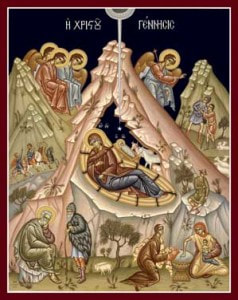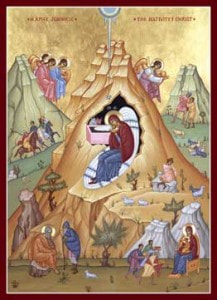 From the Homilies on the Book of St Matthew by St John Chrysostom (#3) FROM HOMILY 7: The NativityLet us then also follow the magi, let us separate ourselves from our barbarian customs, and make our distance from them great, that we may see Christ, since they too, had they not been far from their own country, would have missed seeing Him. Let us depart from the things of earth. For so the wise men, while they were in Persia, saw but the star, but after they had departed from Persia, they beheld the Sun of Righteousness. Or rather, they would not have seen so much as the star, unless they had readily risen up from thence. Let us then also rise up; though all men be troubled, let us run to the house of the young Child; though kings, though nations, though tyrants interrupt this our path, let not our desire pass away. For so shall we thoroughly repel all the dangers that beset us. Since these too, except they had seen the young Child, would not have escaped their danger from the king. Before seeing the young Child, fears and dangers pressed upon them from every side; but after the adoration, it is calm and security; and no longer a star but an angel receives them, having become priests from the act of adoration; for we see that they offered gifts also.
0 Comments
From the Homilies on the Book of St Matthew by St John Chrysostom (#2)
FROM HOMILY 7: “Then Herod, when he had privily called the wise men, inquired of them diligently what time the star appeared” Attempting to slay that which was born—an act of extreme idiotcy not of madness only; since what had been said and done was enough to have withholden him from any such attempt. For those occurrences were not after the manner of man. A star, I mean, calling the wise men from on high; and barbarians making so long a pilgrimage, to worship Him that lay in swaddling clothes and a manger; and prophets too from of old, proclaiming beforehand all this;—these and all the rest were more than human events: but nevertheless, none of these things restrained him. For such a thing is wickedness. It falls foul of itself, and is ever attempting impossibilities.  The Nativity of Our Lord and God and Saviour Jesus Christ The Nativity of Our Lord and God and Saviour Jesus Christ From the Homilies on the Book of St Matthew by St John Chrysostom (#1) Many homilies by Our Father Among the Saints John Chysostom are in the public domain. This quote (and others we will feature) are available for free on the internet. Given the noisy and trashy online environment and our own unworthiness, it is truly a mercy from God that these ancient and precious homilies can be obtained so readily. The Homilies of St John Chrysostom on the Gospel of St Matthew were translated by Rev. Sir George Prevost, M.A., of Oriel College, Oxford and published in the year 1851. Several years later, an American reprint of the Oxford edition was published in the year 1888. Subsequently, a facsimile of this edition was photolithoprinted by Eerdmans Printing Company. The edition we have used was reprinted in May of 1986 and is identified by ISBN 0-8028-8108-4. FROM HOMILY 5: For he doth not call the saying Isaiah’s, but that of the God of all things. For this cause he said not, “that it might be fulfilled which was spoken of Isaiah,” but “which was spoken of the Lord.” For the mouth indeed was Isaiah’s, but the oracle was wafted from above. What then saith this oracle? “Behold, a virgin shall be with child, and shall bring forth a son, and they shall call His name Emmanuel.” How was it then, one may say, that His name was not called Emmanuel, but Jesus Christ? Because he said not, “thou shalt call,” but “they shall call,” that is, the multitude, and the issue of events. For here he puts the event as a name: and this is customary in Scripture, to substitute the events that take place for names. Therefore, to say, “they shall call” Him “Emmanuel,” means nothing else than that they shall see God amongst men. For He hath indeed always been amongst men, but never so manifestly. |
AuthorThe Holy Transfiguration Monastery Archives
May 2012
Categories |
|
CONTACT
The Holy Transfiguration Monastery 278 Warren St Brookline, MA 02445-5950 [email protected] 617-734-0608 617-391-7145 617-277-3858 617-391-8995 617-232-2326 617-419-5063 Fax: 617-730-5783 |
© Content copyright 2018 by The Holy Transfiguration Monastery

 RSS Feed
RSS Feed